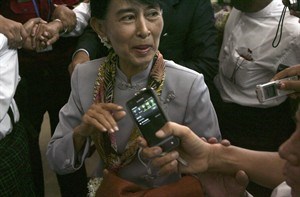
DELETES BYLINE - Myanmar opposition Leader Aung San Suu Kyi talks to reporters as she arrives at Yangon International airport Wednesday, June 13, 2012, in Yangon, Myanmar. Suu Kyi takes her first European trip since 1988 Wednesday to make a long-awaited acceptance speech for the 1991 Nobel Peace Prize and at a time when Myanmar is making tenuous democratic progress. (AP Photo)
June 13, 2012 - 4:00 AM
GENEVA - Twenty-four years ago Aung San Suu Kyi left Europe for what was then a military-controlled nation called Burma. She returns Wednesday the icon of Myanmar's democracy movement to a continent eager to hear from her whether the country's recent reforms truly spell the end of its cruel dictatorship.
The trip is seen as a sign of gratitude to those governments and organizations that supported Suu Kyi's peaceful struggle against Myanmar's generals over more than two decades, 15 years of which she spent under house arrest.
In Geneva, her first stop, Suu Kyi will on Thursday address the annual meeting of the U.N.'s International Labor Organization, whose campaign against slavery and child labour in Myanmar drew constant attention to the junta's abusive exploitation of its people.
Suu Kyi then flies to Oslo, where on Friday she will formally receive the Nobel Peace Prize that was awarded to her 21 years earlier while she was detained by the military after leading a pro-democracy party to victory in Myanmar's 1990 elections.
The prize catapulted her struggle against Myanmar's dictatorship into wider public consciousness and put Suu Kyi among the ranks of Soviet President Mikhail S. Gorbachev, South Africa's anti-apartheid leader Nelson Mandela and the Dalai Lama.
Norway is also home to the Democratic Voice of Burma, an opposition broadcaster that has received generous funding from the Norwegian government and others.
Also on her itinerary are France and Ireland, where she will be feted by pop band U2 and its activist frontman Bono at a concert hosted by the human rights group Amnesty International.
The greatest attention is likely to be paid to her stopover in Britain next week. Suu Kyi studied and lived in Britain for years, and it is in Myanmar's former colonial power she left behind husband Michael Aris and their two sons, Alexander and Kim, when she travelled to her homeland in 1988 to nurse her ailing mother.
Aris died of cancer in 1999, having been denied a visa to Myanmar. Suu Kyi had refused to leave the country, fearing she would be permanently exiled by a junta that saw the daughter of Myanmar's independence hero Gen. Aung San as a threat to their power.
The 66-year-old, who won a parliamentary seat in Myanmar earlier this year, will address both houses of Britain's parliament during her visit and accept an honorary doctorate at Oxford.
Suu Kyu's speeches will be closely watched by governments and businesses, less for the skilful political rhetoric attributed to her than for signs that it is now safe and proper to invest in Myanmar at a time when it is making tenuous democratic progress. In November 2010, she was released from house arrest and in April she won a seat in Parliament.
Eager to compete with China and Japan for Myanmar's abundant resources and emerging consumer class, European countries in April lifted decades-old sanctions imposed on the junta.
At the time, Shada Islam, head of policy at the independent Brussels-based think-tank Friends of Europe, said there were strong economic reasons for Europe to thaw its relationship with Myanmar. "There is concern that with competition to do business with Myanmar heating up, a failure to lift sanctions could penalize European companies vis-a-vis their Asian and American rivals," she said.
But wariness remains over the intentions of Myanmar's President Thein Sein, who retains close ties to the military, and a recent wave of deadly sectarian violence between Buddhists and Muslims in western Myanmar that rights groups say has the potential to escalate.
Her scheduled return to Myanmar by the end of the month gets her back in time to attend the July 4 reconvening of Parliament, which was announced Tuesday night on state television. The parliamentary session will be considering crucial legislation, including media regulation and foreign investment.
News from © The Associated Press, 2012